
Recent terrorist attacks directly targeted the European transport system (Thalys – 21 August 2015, Brussels metro and airport – 22 March 2016). Public opinion is now particularly concerned, and companies, as well as institutions, have started to act to improve the security of the transport system. Major initiatives have been adopted by the European Commission (see, among others the new European Agenda on Security 2015-2020 to support better cooperation between Member States in the fight against terrorism, organised crime and cybercrime), yet the actions that have been taken by the different Member States in the area of security in the immediate aftermath of the terrorist attacks are not always consistent.
An airport style approach to security would not be feasible for rail transport because of its intrinsic nature: it is a mass transit system with several access points on the route and it is highly integrated within the urban environment. Furthermore, in the railway sector – unlike in aviation and maritime transport – there is currently no legal basis for imposing EU measures on passenger security, and very detailed, prescriptive rules on security are not desirable. Soft measures to improve land transport security such as facilitating cooperation and exchange of best practices have been favoured, for instance thanks to the LANDSEC expert group and open discussions on rail passenger security (see, for instance, the conference held on May 10th on this topic). However, measures recently adopted by different Member States are creating a tension between the legitimate need to guarantee rail passenger security and the ultimate goal of establishing a Single European Railway Area (SERA) with common rules for the sector across the EU.
The aim of the 13th Florence Rail Forum is to look at the most controversial aspects creating tension between increasing the level of security and market opening in the railway sector. While we acknowledge that there is no one-size-fits-all approach to rail security in Europe, we will try to identify some common aspects that could and even should be dealt with at the European level. Following the usual format of the Florence Forums, in each session speakers and participants will have the chance to contribute to the discussion moderated by Prof Matthias Finger (École Polytechnique fédérale de Lausanne and European University Institute). Representatives of the European Commission, of major stakeholders as well as academics will engage in the discussion.
The Forum will look at four different aspects of railway security and their possible impact on the SERA and the competiveness of the sector:
Introduction to the Forum will be done by Carlos Mestre Zamarreno (Head of Unit “Security” – DG MOVE) and representatives of the FSR Transport Donors (Deutsche Bahn, EJRC, Ferrovie dello Stato Italiane, ÖBB, SBB, SNCF) as well as associations (UITP, EPF) and companies will be present.
To learn more about our activities in the railway sector please visit the dedicated webpage and/or contact FSR.Transport@eui.eu
European Transport Regulation Observer
Introduction to the 13th Florence Rail Forum – MATTHIAS FINGER, Part-time Professor & Director of the Transport Area, Florence School of Regulation/EUI; and Professor, Ecole Polytechnique Fédérale de Lausanne
Introduction to the 13th Florence Rail Forum – CARLOS MESTRE ZAMARRENO, Head of Unit “Security”, European Commission, DG MOVE
Railway security – DB’s perspective – FRANK MIRAM, Director Economic, Political and Regulatory Affairs, Deutsche Bahn
Cybersecurity in railway systems – IMMACOLATA LAMBERTI, Manager Transportation Systems Security, Ansaldo STS / ANDREA PEPATO, Telecom & Security Engineer, Ansaldo STS
Infrastructure& Security Measures- How ÖBB Strives for the Highest Standards – VICTOR VAUGOIN, Head of Brussels Office, ÖBB
Security within Infrastructure: Stations and Depots – OLOF KJELLSTRÖM, Corporate Strategy and Public Affairs, Jernhusen
How to adjust and improve the security level of infrastructure – LUIGI RUCHER, Technical Director, ThalesGroup / ANDREA BASTIANELLI, ThalesGroup – UNIFE
What can be done to improve staff training and to raise awareness among passengers? – ANNE-LAURE LE MERRE, Senior Advisor Regional and Suburban Rail, UITP
What can be done to improve staff training and to raise awareness among passengers? – MARIA CRISTINA FIORENTINO, Security Department, Ferrovie dello Stato Italiane and Secretary General, COLPOFER
Rail Passengers’ Security: the passengers view – MARCO GARIBOLDI, Italian Delegate, European Passengers’ Federation
JR East Security Measures – KENJI MURASAKI, Deputy Head of Brussels Office, EJRC
Railway Security. SBB Perspective – LUCA ARNOLD, Head of Regulatory and International Affairs, SBB
Railway Security. Responsibility Distribution: Who should regulate? How? – SARAH LAOUADI, EU Affairs Advisor, SNCF

The 4th Florence Rail Regulation Conference aims to discuss advancements for accelerating the growth of the railways in the EU.…

The 3rd Florence Aviation Regulation Conference aims to discuss current and future economic and regulatory policies relating to European air…

The 1st Florence Maritime Regulation Conference aims to discuss regulatory advancements that accelerate the competitiveness and sustainable development of shipping,…
To meet, discuss and learn in the channel that suits you best.